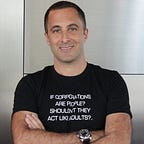#UpgradeEconomics, Innovate Tampa Bay
Philosopher, Adam Smith noted in 1776 that one of the greatest improvements made to the first fire-engines of his time was “the discovery of a boy who wanted to save his own labour” in order to “leave him at liberty to divert himself with his playfellows.” In an 1842 journal entry, Henry David Thoreau wrote that the “really efficient laborer will be found not to crowd his day with work, but will saunter to his task surrounded by a wide halo of ease and leisure.” Nearly 90 years ago John Maynard Keynes predicted that technology could soon solve the “economic problem” of scarcity and that “mankind will be deprived of its traditional purpose.” In a complex world, economists’ lazy reliance on the easy over the accurate is criminal, and history will mark that fact.
Smith identified three physical factors of economic production; land, labor, and capital and an unmeasurable fourth factor dubbed the ‘invisible hand’ that guided the economy. Economist Vinny Tafuro has identified how these four factors have evolved over time and where modern metrics and big data provide an opportunity to quantify Smith’s fourth factor while updating the stewardship of the first three.
The current limited economic paradigm of people existing as labor in competition with automation is setting the global economy up for catastrophe. Labor today is a simple function of capital that may or may not be performed by people. Therefore, labor is no longer synonymous with people. Smith’s three factors are more appropriately identified today in the triple bottom line accounting framework of people, planet, and profits.
In 1759, seventeen years before The Wealth of Nations, Smith first identified the ‘invisible hand’ of society that was driven by human empathy and social trust. Social trust is the foundational yet unmeasured ‘dark matter’ of the economy. It relies on the cumulative social capital of all human beings. Until now, no quantitative metrics have been proposed.
Gross Domestic Product, the sole industrial economy metric, counts the production and distribution of goods and services. Any social capital that is not commercially monetized is simply not counted. From stay home parents and community volunteers, to the value of journalism and scientific research, GDP simply ignores it all. In 1968 Robert F. Kennedy succinctly noted that GDP “measures everything in short, except that which makes life worthwhile.”
Social capital today must be acknowledged, measured, and cultivated. Tafuro is developing metrics that will allow a future where all human value creation is appropriately quantified by the field of economics. Where our employment and education crises are resolved by expanding our definition of compensable work guided by a Social Capital Index based on big data. An index to augment Gross Domestic Product and modernize economics; to first stabilize, then liberate the global economy.
Thanks for reading! If you enjoyed it, please clap below and share this to let others know. Your love is appreciated!
This article was first publish in the Innovate Tampa Bay, Volume 1., released on November 14, 2017. Books can be purchased from the publisher, Global Village.
